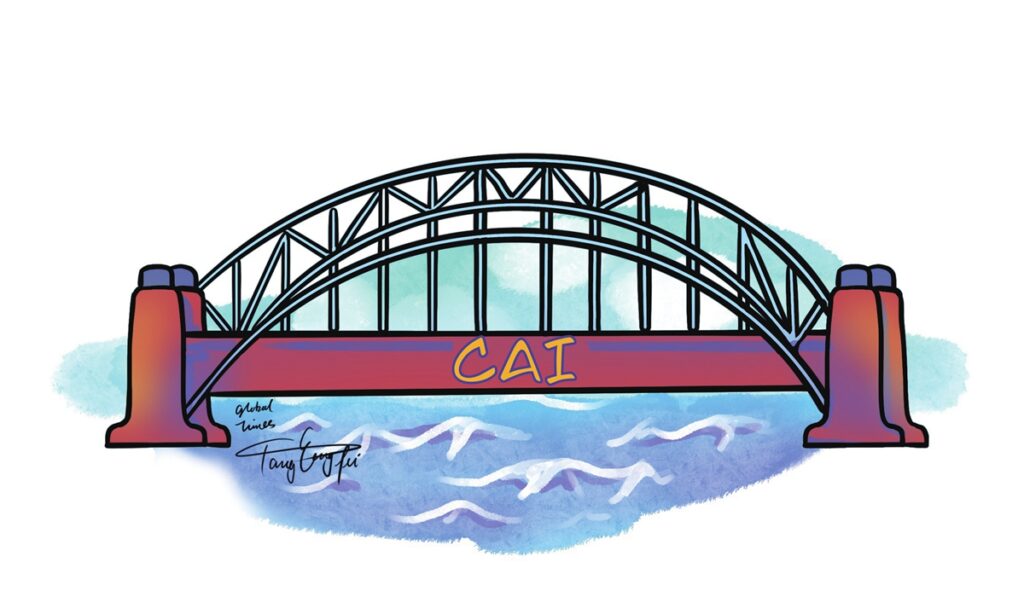EU trade chief Valdis Dombrovskis on Monday said the EU will hold a summit with China on April 1 in an attempt to diffuse growing tensions between the two, Reuters reported. Referring to the China-EU Comprehensive Agreement on Investment (CAI), which was stalled by the unilateral freeze taken by the European Parliament last May, Dombrovskis said some topics need to be “addressed at the highest political level to see to what extent China and EU can align and improve cooperation.”
EU officials have recently frequently referenced the need to address differences and ease tensions when it comes to relations with China. Josep Borrell, the EU’s high representative for foreign affairs and security policy, on Friday said that both sides should be committed to resolving difficulties through dialogue.
Seeking communication to defuse tensions, the EU has shown a degree of getting back on track in its handling of relations with China. For a period of time, the EU has been influenced to a large extent by the US on a series of issues ranging from human rights to Lithuania. The bloc’s unilateral move to weaponize the CAI had disrupted China-EU ties and deviated from the EU’s own benefits.
If Chinese and EU leaders do meet next month as EU officials claim, the CAI will undoubtedly be one of the most important topics at the upcoming summit.
After seven years of negotiation, the leaders of China and EU were able to reconcile the investment agreement at the end of 2020, but the abrupt freeze by Europe in May 2021 has put the agreement on hold. This hard-won investment agreement is expected to bring great benefits to the Chinese and European economies, needs urgent ratification.
EU trade chief’s latest remarks on the CAI demonstrate EU’s willingness to relaunch the process, a rational stance echoed by a growing number of European political and business elites, who know well that it is against Europe’s interests if EU continues to allow the CAI to be left in limbo.
China-EU economic and trade relations are highly mutually beneficial. China’s swift recovery from the COVID-19 impacts has made it an even more important source of growth and profits for European businesses. According to Business Confidence Survey 2021 published by the European Union Chamber of Commerce in China, 60 percent of the surveyed companies plan to increase investment in China and a quarter plan to move supply chains onshore. It is not difficult to imagine that a large number of European companies are pinning their hopes for the ratification of the CAI.
Admittedly, China-EU bilateral relations are experiencing ups and downs due to so-called human rights issue and China-Lithuania dispute. Yet, the EU should take steps to ensure these issues are not amplified or complicated, while also preventing them from hijacking the mutual beneficial relations and investment deal.
By intensifying the so-called human rights differences between China and the West, the Biden administration is hoping to contain China’s rise and safeguard its own hegemony. If the EU lets such issues sabotage its important investment deal with its top trade partner, it is actually serving the US’ geopolitical ambition at the expense of its own benefits.
From freezing the CAI to seeking dialogue to settle the matter, the positive shift in attitude among EU officials shows the investment agreement’s great significance to the EU’s post-pandemic economic recovery. Now, the EU is facing an opportunity to relaunch the process to ratify the agreement with China, with the ball in their court.
China’s Commerce Minister Wang Wentao said on Tuesday that despite differences, China and Europe can still strengthen communication to promote healthy competition. No doubt, if the EU shows sincerity, China will meet it halfway to continue to promote CAI together and make greater contribution to global post-COVID recovery.
Illustration: Tang Tengfei/GT




